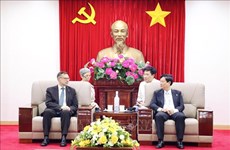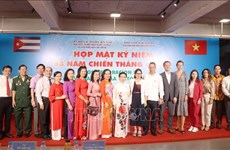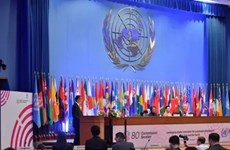ASEAN foreign ministers agree on major issues
Foreign Ministers from ASEAN member countries reached agreement on
numerous important issues at the 43rd ASEAN Ministerial Meeting (AMM-43)
in Hanoi on July 20.
Foreign Ministers from ASEAN member countries reached agreement on
numerous important issues at the 43rd ASEAN Ministerial Meeting (AMM-43)
in Hanoi on July 20.
They agreed to strictly and effectively implement cooperation programmes and plans in the roadmap for building an ASEAN Community.
They affirmed that boosting efforts to tighten ASEAN linkage would make a strong foundation for regional connection.
The ASEAN FMs also agreed to speed up efforts to comprehensively implement the ASEAN Charter by continuing to complete and improve the coordination of agencies in the new apparatus and complete all documents to create a legal framework for ASEAN activities at present and for an ASEAN Community in the future.
They passed a two-year working plan for the ASEAN Intergovernmental Commission on Human Rights (AICHR).
The FMs affirmed ASEAN’s determination and efforts to uphold their key role in boosting cooperation for peace, security and stability in the region and to accelerate negotiations, cooperation and building trust on issues of regional political and security cooperation.
They stressed that ASEAN would continue accelerating the implementation of mechanisms and institutions for peace and security in the region, including the Treaty of Amity and Cooperation in Southeast Asia (TAC), the Southeast Asia Nuclear Weapon-Free Zone (SEANWFZ), the Declaration on the Conduct of Parties in the East Sea (DOC) and the ASEAN Regional Forum (ARF).
At the meeting, the ASEAN FMs agreed to hold a signing ceremony for Canada and Turkey to join the TAC. TAC participating countries will also sign a protocol on amendment of TAC to create favourable conditions for EU/EC countries to join this treaty.
They also stated their intention to continue cooperation in fighting terrorism, transnational crime, maritime security and safety.
On ASEAN external relations, the FMs affirmed to continue deepening practical and effective cooperation with their partners, focusing on economic trade and investment, finance, energy, food, climate change, natural disasters and epidemic control.
ASEAN will cooperate with its partners in the preparations for ASEAN Summits with partners, including China , Japan , the Republic of Korea , India , Russia , the US , the UN, Australia and New Zealand , to be held in the second half of the year.
They also approved the appointment of 11 ambassadors of partner countries to ASEAN, bringing the total number of ambassadors to ASEAN to 41.
They had discussions on the vision for the regional structure in the future to ensure ASEAN continues to play a central role.
ASEAN encourages partners to take part in the shaping of regional cooperation structure.
They hailed Russia and the US for their wish to become members of the East Asia Summit (EAS) and will ask ASEAN leaders to offer an official invitation to the two countries at the 17 th ASEAN Summit (scheduled for October in Hanoi ).
Affirming the importance of the cooperation mechanism of the ASEAN+3 and EAS to the process of the East Asia cooperation, the ASEAN FMs agreed to continue speeding up the two processes with ASEAN+3 being a major tool and EAS supporting a long-term target of building an East Asia Community.
The ASEAN ministers also exchanged views on regional and international issues of mutual concerns, particularly on ASEAN efforts on recovery and sustainable development.
ASEAN praised Vietnam , as ASEAN Chair, for coordinating the bloc’s common stance and for contributing to the recent Toronto G-20 Summit.
They approved the joint communique of AMM-43./.
They agreed to strictly and effectively implement cooperation programmes and plans in the roadmap for building an ASEAN Community.
They affirmed that boosting efforts to tighten ASEAN linkage would make a strong foundation for regional connection.
The ASEAN FMs also agreed to speed up efforts to comprehensively implement the ASEAN Charter by continuing to complete and improve the coordination of agencies in the new apparatus and complete all documents to create a legal framework for ASEAN activities at present and for an ASEAN Community in the future.
They passed a two-year working plan for the ASEAN Intergovernmental Commission on Human Rights (AICHR).
The FMs affirmed ASEAN’s determination and efforts to uphold their key role in boosting cooperation for peace, security and stability in the region and to accelerate negotiations, cooperation and building trust on issues of regional political and security cooperation.
They stressed that ASEAN would continue accelerating the implementation of mechanisms and institutions for peace and security in the region, including the Treaty of Amity and Cooperation in Southeast Asia (TAC), the Southeast Asia Nuclear Weapon-Free Zone (SEANWFZ), the Declaration on the Conduct of Parties in the East Sea (DOC) and the ASEAN Regional Forum (ARF).
At the meeting, the ASEAN FMs agreed to hold a signing ceremony for Canada and Turkey to join the TAC. TAC participating countries will also sign a protocol on amendment of TAC to create favourable conditions for EU/EC countries to join this treaty.
They also stated their intention to continue cooperation in fighting terrorism, transnational crime, maritime security and safety.
On ASEAN external relations, the FMs affirmed to continue deepening practical and effective cooperation with their partners, focusing on economic trade and investment, finance, energy, food, climate change, natural disasters and epidemic control.
ASEAN will cooperate with its partners in the preparations for ASEAN Summits with partners, including China , Japan , the Republic of Korea , India , Russia , the US , the UN, Australia and New Zealand , to be held in the second half of the year.
They also approved the appointment of 11 ambassadors of partner countries to ASEAN, bringing the total number of ambassadors to ASEAN to 41.
They had discussions on the vision for the regional structure in the future to ensure ASEAN continues to play a central role.
ASEAN encourages partners to take part in the shaping of regional cooperation structure.
They hailed Russia and the US for their wish to become members of the East Asia Summit (EAS) and will ask ASEAN leaders to offer an official invitation to the two countries at the 17 th ASEAN Summit (scheduled for October in Hanoi ).
Affirming the importance of the cooperation mechanism of the ASEAN+3 and EAS to the process of the East Asia cooperation, the ASEAN FMs agreed to continue speeding up the two processes with ASEAN+3 being a major tool and EAS supporting a long-term target of building an East Asia Community.
The ASEAN ministers also exchanged views on regional and international issues of mutual concerns, particularly on ASEAN efforts on recovery and sustainable development.
ASEAN praised Vietnam , as ASEAN Chair, for coordinating the bloc’s common stance and for contributing to the recent Toronto G-20 Summit.
They approved the joint communique of AMM-43./.













